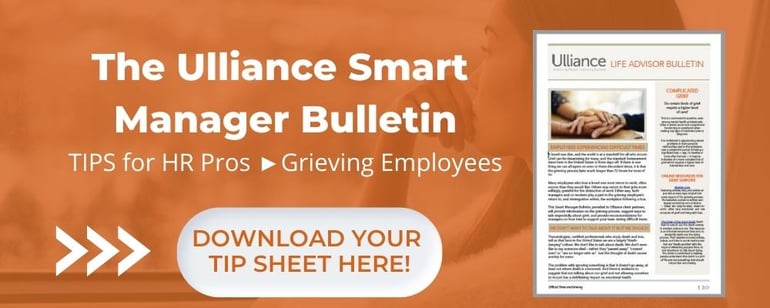If three years ago I asked, “have you ever lost someone you love?” I have no doubt I’d have gotten different answers than if I had asked today. Three years ago, people gathered as a family to celebrate the deceased person’s life.
Their death wasn’t a headline or a tragedy shared by nations.
A fair amount of people were still untouched by tragedy before the pandemic, and though they knew about grief, they had thus far escaped it. But now the world is a different place and, a strange and heavy silence mingles in our air like the breath of a million last words.
Grief has gone global, and it has affected about a third of the world’s population. They have been touched by the gut-wrenching pain of losing someone they love and as HR professionals you are likely dealing with many grieving employees.
Knowing you aren’t suffering alone doesn’t take away the pain, but knowing you aren’t alone may help get you through a rough day.
There will be many rough days but understanding a few things about grief will reassure you that you are normal as you readjust to a new, very different you, living a very different life.
3 Things You Need to Know
1. The Stages of grief are not orderly.
People don’t start at the first stage and end at the final stage. Individual’s feelings at any given moment determine their stage, which can change from minute to minute.
2. Time doesn't heal everything, and it's not school.
People don't pass through each stage and get a "Completed Grieving with Honors" certificate at the end because there is no end. The pain eases, but it never goes away.
3. when individuals experience loss they are never the eXact person again.
The pain of that loss is like a scar across their heart, and it changes them at their core. They can learn to work around it, but it lingers in the background. There is no wrong way to grieve and no “proper” time period for mourning when you lose someone or something you love.
If you have been fortunate enough to not have had a death in your family, you probably know someone wasn’t so fortunate. It’s a helpless feeling watching someone you care about hurting so deeply. What can you do? What should you say? How can you help?
I
“And when great souls die, after a period peace blooms, slowly and always irregularly. Spaces fill with a kind of soothing electric vibration. Our senses, restored, never to be the same, whisper to us. They existed. We can be. Be and be better. For they existed.”– Maya Angelou
Grief Stages: Beginning to End and Back Again
Kubler-Ross outlined five stages of grief people pass through after they lose a loved one. One through five in chronological order. However, research shows that not everyone processes grief in chronological order. Instead, they volley back and forth between them.
Others never process through the stages at all and stay stuck in denial and anger.
The Five Stages of Grief
• Denial
• anger
• Bargaining
• Depression
• Acceptance
1. Denial – The purpose of denial is to survive the emotional shock of the overwhelming pain of loss.
2. Anger – Anger is a common emotion after losing a loved one. In trying to process all that has happened, people want to know why. Why did he get in the car with a drunk driver? Why didn’t he eat healthier food? Why didn’t he take a later flight as you suggested?
3. Bargaining – it isn't unusual to feel so desperate that you are willing to do almost anything to alleviate or minimize the pain. You bargain with God. You bargain with the devil. You make promises never to get angry again nor say a harsh word if they can just live through this.
4. Depression – During your grief processing, your imagination calms down, and you slowly start to look at the reality of your present situation. You realize there are no deals to make and that you must face what is happening.
5. Acceptance – Acceptance means you no longer struggle to control your anger and desperation for things to be different. You still feel the pain of the loss, but you don’t deny the reality of the situation.
It’s important to realize that grief isn’t just about death. A loss could come from any part of your life. Grief comes in many shapes and sizes. You may grieve the loss of a friend or sibling.
Maybe you have moved and are feeling the loss of friendships or a future you planned but now will not happen.
Many people grieve the loss of themselves, a future they will never have, and a past they were never given.
So much pain, so many ways to grieve
As you know, you will not get through your life without experiencing some form of grief. How you grieve is as personal as your perfume or cologne. Everyone does it in a way that works best for them.
There are approximately 16 ways that people grieve:
• Normal Grief (or Uncomplicated grief)
• Complicated grief (or abnormal grief)
• Traumatic grief
• chronic grief
• anticipatory grief
• disenfranchised grief
• distorted grief
• exaggerated grief
• masked grief
• inhibited grief
• Collective grief
• cumulative grief
• prolonged grief
• abbreviated grief
• delayed grief
• absent grief
For a detailed view of each type, you can go here. To identify your grief type, read through each description and then try to identify parts to which you can relate. Sometimes just putting a name to the problem is helpful and could save you time later.
Maybe you are here because someone you love is grieving, and you want to help them, but you don’t know how. There are simple but powerful things you can do besides say I am sorry for your loss.
7 hr tips to help grieving employees
1. avoid asking, "how are you?"
The answer is clear and lacks the acknowledgment that they are suffering. Instead, try, “How are you feeling today?”
2. Be available
Tell them you are available to talk, take them to lunch.
3. offer to help
Offer to inform the team about their loss.
4. Encourage using eap
The EAP can help to manage the grieving process.
5. be flexible
Be flexible with their work schedules for a bit.
6. offer hope
Hope is the only thing that pushes people to go on. Tell them you know they are hurting now. It will get better. Let them know that you understand nothing will be the same but there is still so much to look forward to.
7. Reach out
Reach out by calling to check-in. Ask if they need anything.
Whether you are grieving or being there for someone else, it is important to remember that grief doesn’t have an expiration date. Everyone travels this journey forging their own path no matter how long it takes.
No one should have to grieve alone, if the loss is yours, allow family members to walk alongside you sharing your journey. This is where promoting the use of your EAP is a good idea!
When you partner with Ulliance, our Life Advisor Consultants are always just a phone call away to teach ways to enhance your work/life balance and increase your happiness. The Ulliance Life Advisor Employee Assistance Program can help employees and employers come closer to a state of total well-being.
Investing in the right EAP or Wellness Program to support your employees will help them and help you. Visit https://ulliance.com/ or call 866-648-8326.
The Ulliance Employee Assistance Program can address the
following issues:
• Stress about work or job performance
• Crisis in the workplace
• Conflict resolution at work or in one’s personal life
• Marital or relationship problems
• Child or elder care concerns
• Financial worries
• Mental health problems
• Alcohol/substance abuse
• Grief
• Interpersonal conflicts
• AND MORE!
References
"Types of Grief: The 16 Ways People Grieve." Retrieved from USURNS Online: https://www.usurnsonline.com/grief-loss/types-of-grief/.



